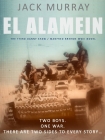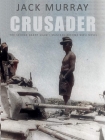El Alamein by Jack Murray (spanish books to read .TXT) 📗

- Author: Jack Murray
Book online «El Alamein by Jack Murray (spanish books to read .TXT) 📗». Author Jack Murray
In the inter-war years, he continued his active service in Ireland before taking a training role in India. By this time, he had married and had a son. His wife died a couple of years before the outbreak of the Second World War.
His trenchant personality was polarising to many. This may have held him back in the early stages of the war. However, notwithstanding his difficult nature, there was no arguing with the effectiveness with which he trained and led his commands in preparation for invasions of Portugal or in defending against any German landings. As the situation in North Africa continued to deteriorate, it was to Montgomery that Churchill turned following the unexpected death of his first choice to lead the 8th Army, General Gott.
Following the success of the North African campaign, Montgomery led the Eighth Army in the invasion of Italy. Although ultimately successful, Montgomery was dissatisfied by the campaign and the inefficient deployment of the overwhelming superiority enjoyed by the Allies.
In early 1944, Montgomery was assigned to the planning of the second front, ‘Overlord’. Montgomery took part at the head of the 21st Army Group. As ever, his success was mixed with endless altercations with those around him and other senior commanders. However, his contribution to the ultimate victory cannot be questioned.
Montgomery continued to serve in the army and, later, under Eisenhower under the auspices of NATO. The final word should go to his friend and sometime sparring partner, Winston Churchill.
"In defeat, unbeatable; in victory, unbearable.
AXIS ARMY
Erwin Rommel(1891 – 1944)
German World War II Field Marshal. Erwin Johannes Eugen Rommel led the North African campaign of 1941-1943. With a small German force, Rommel’s audacious leadership turned around Axis fortunes in North Africa causing the defeat of the British at Gazala in May 1942, followed by the taking of Tobruk. A vastly superior allied force under Bernard Montgomery won a convincing victory at El Alamein. Rommel withdrew the survivors of his Panzer army to Tunisia. He left for Europe in March 1943. Rommel’s last military appointment was to command the Army in northwest Europe. By then Rommel had lost all faith in Adolf Hitler. His disenchantment led to a confrontation with Hitler and a possible involvement in a failed assassination attempt. He committed suicide in 1944. He was given a state funeral.
Lieutenant-Colonel Johannes Kummel (1909-1944)
Johannes Kümmel, ‘the Lion of Capuzzo’ was a highly decorated tank commander in the 15th Panzers during World War II. During the Allied attack of June 1941, Operation Battleaxe, Kümmel destroyed 10 enemy tanks, forcing the British to retreat. This earned him the nickname ‘The Lion of Capuzzo’.
One of only 882 recipients of the Knight's Cross of the Iron Cross with Oak Leaves, awarded to recognise extreme battlefield bravery or successful military leadership, Kümmel left North Africa prior to El Alamein, fighting later in Italy before being killed in car accident in 1944 in Cisterna, Italy. He was posthumously promoted to Oberst (Colonel).
General Hans Cramer (1896 – 1968)
Lieutenant-Colonel Cramer led the 15th Panzer division during the Crusader action. He stayed with the regiment until early 1942 when he returned to Germany. He returned to North Africa in 1943 as a general. During the Allied push following the success at El Alamein, he was taken prisoner. After a period in captivity, he was exchanged in 1944 for Allied prisoners. As a former POW, he was suspected of involvement in the 20 July plot to assassinate Adolf Hitler and held under house arrest.
Captain Hans Marseille (1919 -1942)
‘Careful, Marseille is in in the air’ was reputed to be a common radio message for the RAF when Marseille flew. While one can never be certain about the number of actual ‘kills’ he made, there can be no doubt Marseille was responsible for downing well over 100 Allied planes while he was in North Africa, possibly 17 in one day on 1 September 1942. He died by accident soon after receiving the Iron Cross, just before El Alamein. While on an escort mission his plane began to fill with smoke. He died while attempting to parachute to safety. It is reputed that the RAF dropped a wreath for the Marseille.
THE BATTLES
Operation Crusader (Nov–Dec 1941)
The Crusader operation was the subject of the previous book in this series, Sidi Rezegh, although given the complexity of the battles and span of time over which they took place, it was not possible to encompass all within the realms of a fictional piece.
Crusader was born in the aftermath of the ill-fated Operation, Battleaxe (June 1941). It began in the second half of November of the same year by which time both sides had received considerable reinforcements. The German 90th Light Division had arrived in North Africa and the Afrika Korps (DAK) had increased the strength of its powerful 88mm anti-tank guns to thirty-five.
The 5th Leicht Division, had been re-equipped with new medium Mark III Panzer tanks and renamed 21st Panzer Division. Three new Italian divisions arrived to strengthen further the Axis forces, bringing them up to three German and six Italian divisions.
The British received another three motorised infantry divisions, Stuart tanks and ten more armoured regiments. These reinforcements totalled 115,000 men, none trained in desert warfare and not yet fit for immediate operations.
Operation Crusader began on 18th November, pre-empting an attack by the Germans and Italians due for 23rd November and thus the German 15th Panzer and 90th Light Divisions were already in position for their own attack. This meant that they were well placed to thwart the British advance, which was made in heavy rain.
For the next several weeks one of the most complicated battles in the history of warfare ensued with advantage swinging back and forward as the two armies battered one another to a standstill. At no point did either side gain a decisive advantage. Better leadership would have carried the day much earlier as victory was, at different times, very close for each side..
By Christmas, the Germans, wearied and running low on materiel





Comments (0)